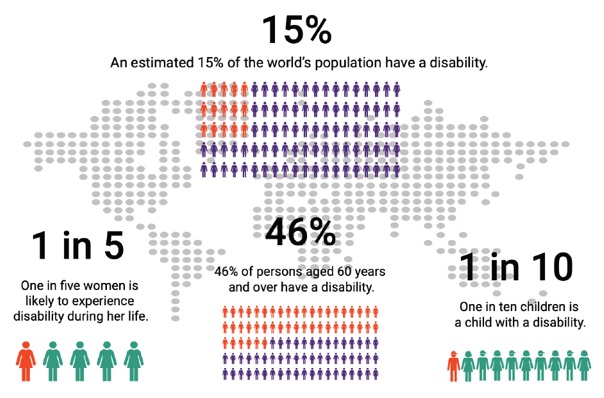Debunking 5 Misconceptions of Incorporating Theatre in Special Education Classroom: Comprehensive Guide
12th September 2023
In the education setup, every student is different from each other and has different abilities and learning needs. In the case of children with special needs, teachers often struggle to find ways to engage them in their academics.
According to unoosa.org, 1 in 10 children is children with some kind of special needs.

Source: unoosa.org
This makes the role of special education more important in society because it will help those children to thrive not just academically but in their overall growth as well.
But, what if we told you, there’s a creative way to engage them in the classroom setting which is incorporating theatre? You may be thinking that there’s no chance that students are going to participate in theatrical activities and it will be of any help.
However, the reality is much different. Theatre is one of the fun and entertaining ways to develop communication skills, boost self-confidence, and improve creativity in children with special needs.
In this blog post, we will debunk five common myths that many special education needs teachers have about bringing theater into the special education classroom and we will also get to know effective strategies to make this idea of bringing theatre into the classroom a success.
Before moving to the topic, can we ask you a question? Do you follow us on Social Media? We regularly share upgraded educational content, tips, feedback, and more. Check us out by clicking the profiles here - Facebook / Twitter / LinkedIn / Pinterest / Instagram / YouTube
So, without any further delay, let’s get started.
5 Myths About Theatre in Special Education Classroom Setting
We will debunk some common beliefs or myths that most teachers think before introducing theatres into special education classroom settings.
Myth 1: Theatre is Not For Non-Verbal People
The first myth that almost every person has is the belief that theatre is only for people who can speak. In reality, theatres are about much more than just delivering lines. Facial expressions, gestures, and movement can all be powerful forms of communication. So, if you have students who are non-verbal, don't worry! They can still participate in theatre and express themselves in their own unique ways.
Strategy to Involve Non-Verbal Students in Doing Theatre
For those who communicate using Sign Language, incorporating sign language into performances can be a wonderful way to showcase their talents. Lines can be expressed through sign language, acted-out narration, or even through visual aids such as posters.
Additionally, vocal singing paired with sign language can support students who have different modalities of communication. Encourage your students to choose the mode of communication that works best for them and make sure they feel supported and included on stage.
Myth 2: Theatre is Only For People with Proper Motor Skills
Another misconception is that theatre is limited to those students who have full mobility and those who have fully functional motor skills. However, theatre is an inclusive art form that can be adapted to accommodate students with limited mobility. Scripts can be created in such a way that fits the abilities of the actors involved, allowing for both stationary and mobile characters.
Strategy to involve students with Limited Motor skills in doing theatre
When it comes to dancing, focus on emotional expression and rhythm rather than complex movements. For students who have limited mobility and motor skills you can encourage their participation in theatre by encouraging them to move their arms express facial expressions or even utilize assistive devices that enhance their movements. The important thing is to create an environment where everyone feels comfortable and empowered to express themselves in their unique way.
Myth 3: Teaching Theatre Requires Theatrical Background
Contrary to belief, you don't need to be an expert in theatre to introduce it into your classroom. Theatre is about creativity, expression, and imagination and anyone with a passion for the arts can facilitate theatre activities. You can start by incorporating activities like singing favourite songs playing charades or asking students to demonstrate different emotions or animal behaviours. These activities are all forms of theatre can effectively engage your students while sparking their creativity.
Strategy for Incorporating Theatre Without Prior Theatrical Skills
Acting essentially involves pretending. Anyone can pretend! As a teacher, your role is to guide and support your students as they explore their acting abilities. You don't need to be a trained Shakespearean actor to provide this guidance, your enthusiasm and encouragement will be more than enough to create a positive and inclusive theatre experience.
Myth 4: Incorporating Theatre Requires Plenty of Planning
It's true that incorporating theatre into the classroom requires some planning, but it doesn't detailed and extensive planning. As a teacher, you already possess the skills of improvisation and adaptability, which are essential in theatre. Take advantage of these skills, embrace the spontaneity that theater offers, and at the same time encourage special needs students to participate in it.
Strategy to Incorporate Theatre With Little Planning
To create a play, you can turn any story, song, or poem into a theatrical performance. Act out folk tales, and storybooks, or even create your own scripts with input from your students. Use books as a starting point and assign characters to different groups of students. Encourage creativity and collaboration as they bring the story to life on stage.
Just remember the main goal is to make learning enjoyable and meaningful for your students. Don't hesitate to think and try out different approaches. Embracing improvisation will make the theatre experience more rewarding and fun for both you and your students.
Myth 5: Theatre doesn't have any real benefits for students
Most of the people have this misconception that theatres aren't beneficial for children with needs. In reality, theatre offers a range of advantages for these students. Engaging in theatre activities helps them develop life skills and contributes to their overall well-being.
Various Opportunities Provided by Theatres for Students with Special Needs
Theatre presents opportunities for students to improve their communication skills. By participating in acting, they learn how to project their voice articulate their words clearly and maintain eye contact. These skills are not valuable on stage but also, in their daily lives.
The theatre also promotes social skills as students work together, collaborate, and support each other as a team. Moreover, theatre allows students to explore and express their emotions in a safe and supportive environment. It encourages self-confidence, empathy, and self-efficiency. As students engage in theatre activities, they learn to step into the shoes of different characters, understand different perspectives, and develop a deeper understanding of themselves and others.
Incorporating Theatre into Special Classroom Can Give Outstanding Results
Teaching and understanding children with special needs requires a unique skillset in teachers. However, those teachers who have pursued courses like Live Online International Teaching Diploma Course knows engaging and entertaining ways to help special needs students not just academically but in their overall growth as well. One of the less used but effective methods is incorporating theatres into classroom settings.
Moreover, there are plenty of myths about theatre in special education classrooms, and for that reason, we have created this blog post. You can get to know many myths debunked and some effective strategies to incorporate theatre successfully within the classroom.
Remember, theatre is inclusive, adaptable, and accessible to all. So, let the curtains rise and watch your students shine on stage, which will help them develop their communication skills, self-confidence, and creativity as well!
We believe education should be accessible for everyone. That’s why we don’t charge for our blogs. Find the right course that will help you in your career with us, contact us at - 1800-212-6400. You can mail us at act@asiancollegeofteachers.com.
Written By : Abhishek

